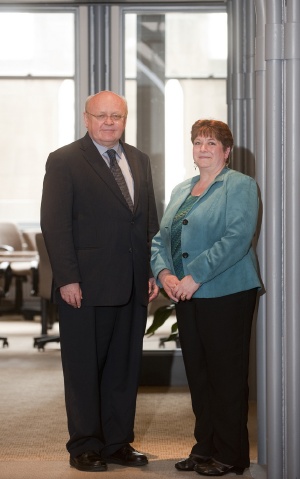May 26 2009
The PPG Industries Foundation, a global supplier of paints, coatings, optical products, specialty materials, chemicals, glass and fiber glass, has pledged $500,000 to the Department of Chemistry at the University of Pittsburgh for a laboratory focused on the rapidly developing field of nanoscience.
 The PPG Industries Foundation has pledged $500,000 to the Department of Chemistry at the University of Pittsburgh for a laboratory focused on the rapidly developing field of nanoscience. Sue Sloan, executive director of the PPG Foundation, met with Dr. John Cooper, dean of arts and sciences at Pitt, to discuss the gift. PPG is currently interested in several emerging developments in the field of nanoscience.
The PPG Industries Foundation has pledged $500,000 to the Department of Chemistry at the University of Pittsburgh for a laboratory focused on the rapidly developing field of nanoscience. Sue Sloan, executive director of the PPG Foundation, met with Dr. John Cooper, dean of arts and sciences at Pitt, to discuss the gift. PPG is currently interested in several emerging developments in the field of nanoscience.
The PPG gift will establish the Nanomaterials Characterization Laboratory, a core support laboratory in the Department of Chemistry that will be useful for all of the sub-disciplines of nanoscience represented by current faculty and recruitment targets.
Nano-scale materials are an increasingly important area of scientific research impacting a host of emergent technologies ranging from medical sensing to energy storage to miniaturized electronics. These materials, which are intermediate between the classical molecular structures studied by chemists and bulk materials encountered in everyday life, often have unique properties that are dependent on their tiny size, more than a thousand times smaller than the width of a single human hair.
John Cooper, dean of arts and sciences at the University of Pittsburgh, notes, “The University of Pittsburgh has been a leader in this complex and important field of research, and PPG’s support will help us renovate and improve our laboratory assets to move ahead rapidly in the international nanoscience arena. Infrastructure supported by this gift will enable recruitment of world-class researchers, faculty with the expertise to educate the next generation of nano scientists and position the University as a major contributor to this new frontier of knowledge.”
Pitt researchers have shown that nanomaterials have the potential to enable a 1,000 fold increase in computer processing and memory capacity, medical sensors for painless monitoring of a patient’s health, improved solar energy cells, and numerous other applications. “Nanomaterials are currently used to make plastics for eyeglasses, computer displays and cameras, that are lighter, stronger and more durable,” he said. “Looking forward, Pitt research demonstrates that nanomaterials will one day monitor your blood chemistry, test your food, water and air, and log the resulting data in high capacity electronic memory, using solar power.”
Sue Sloan, executive director of the PPG Industries Foundation, said, “Since 1971, PPG has provided nearly $3 million to the University of Pittsburgh for research and educational initiatives in areas of strategic importance. We currently support several projects related to nanoscience, and having this world-class university in our backyard promotes positive collaboration and provides PPG and other Pittsburgh companies with a competitive edge as new nanoproducts are developed.”
Established in 1951, the PPG Industries Foundation demonstrates the values of PPG Industries by enhancing the quality of life in communities where the company has a presence. Interests of the foundation, in order of priority, are education, human services, culture and arts, and civic and community affairs. PPG also supports charitable causes by encouraging employee volunteerism and executives’ involvement with nonprofit organizations.